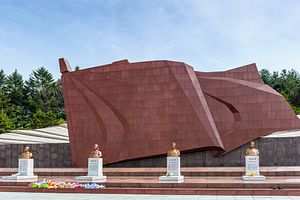Relations between North and South Korea have vacillated mightily the last few days. The ability to decipher them is made increasingly difficult by the absence of North Korea’s leader Kim Jong-un, who has been out of the public eye for a month. While Pyongyang is notorious for sending mixed signals to the outside world, and even to benefactors like China and South Korea, Tuesday’s events offer a renewed glimpse of the seemingly bipolar nature of the Hermit Kingdom.
On Tuesday morning at 9:50 a.m. local time, North and South Korean naval patrol boats opened fire near the South Korean island of Yeonpyeong, on the Northern Limit Line, which Pyongyang does not recognize as an international boundary. South Korea’s Ministry of National Defense said its patrol boat identified a North Korean vessel about half a nautical mile inside what Seoul claims as its territorial waters and fired a warning shot. Instead of retreating, as is usually the case, the North Korean patrol boat returned fire, at which point a defense ministry spokesman said “our side fired back.” Neither vessel was damaged during the incident, which lasted about ten minutes, during which the South estimated its patrol boat fires around 90 rounds. However, it should be noted that the spokesman indicated that neither vessel made a serious attempt to hit its opponent.
Instances where North and South Korean ships trade non-lethal fire near their disputed maritime border are not especially uncommon, as North Korean naval and fishing vessels frequently intrude on South Korean waters, and limited naval engagements occurred in 1999, 2002 and 2009. The location of Tuesday’s exchange is significant however, as Yeonpyeong Island was the target in November 2010 of North Korean shelling that killed four South Korean civilians and raised concerns about the possibility of a wider and more sustained conflict.
And although the incident by itself isn’t completely unique, the timing certainly was. This is because on Saturday North Korea sent its most senior delegation ever to Seoul, ostensibly to watch the closing ceremony of the Asian Games. However, that rationale is fairly thin, as Pyongyang gave barely 24 hours’ notice and only stayed for 12 hours, and such a high-level delegation sends a completely different message when arriving at such short notice. The delegation included Hwang Pyong-so, who holds several high positions in the North Korean Leadership and is believed to be the country’s de facto number two leader, as well as Choe Ryong-hae and Kim Yang-gon, who also hold high ranking military and party positions.
As my colleague Zach pointed out on Saturday, the purpose of this delegation’s meeting with South Korea’s prime minister, unification minister, and national security advisor was certainly not to discuss the Asian Games. Perhaps it was to conduct a sensitive piece of business or pass along a personal message from North Korea’s leader; however, both of those things could have been done in a much simpler and quieter fashion. The visit itself may have been the message, as the North Koreans assured their counterparts that Kim Jong-un had no serious health troubles despite his public absence. A swift and unexpected visit from such a high-level group of officials may be intended to show that Pyongyang’s leadership is not only united and able to conduct business as usual, but can carry out affairs of state in the leader’s absence. In that vein, it is notable that the visiting officials said they hoped their trip “becomes a positive occasion for improved ties between the North and the South.”
The issue does indeed boil down to Kim Jong-un’s whereabouts, given that his absence is the biggest anomaly in North Korea’s recent erratic behavior. Whether Tuesday’s exchange was intended to strengthen the military’s image, as is often the case when the North’s leadership is experiencing turmoil, or to underline the power of the delegation that visited on Saturday, it will hardly help to improve ties with the South.
North Korea’s leadership has steadily stepped up attempts to improve ties with its neighbors and the international community recently, with its foreign minister touring several European countries and attending the U.N. General Assembly last week, albeit without much success. Some clarity on Pyongyang’s recent activity may come at the ruling Worker’s Party anniversary celebration on October 10, a highly important national event the young leader cannot miss without raising serious concerns about his whereabouts. Whether North Korea’s leadership is laying the groundwork for a serious announcement about Kim Jong-un’s health is unclear, but its behavior is becoming more nebulous and erratic as the country’s next big public event draws near.
































